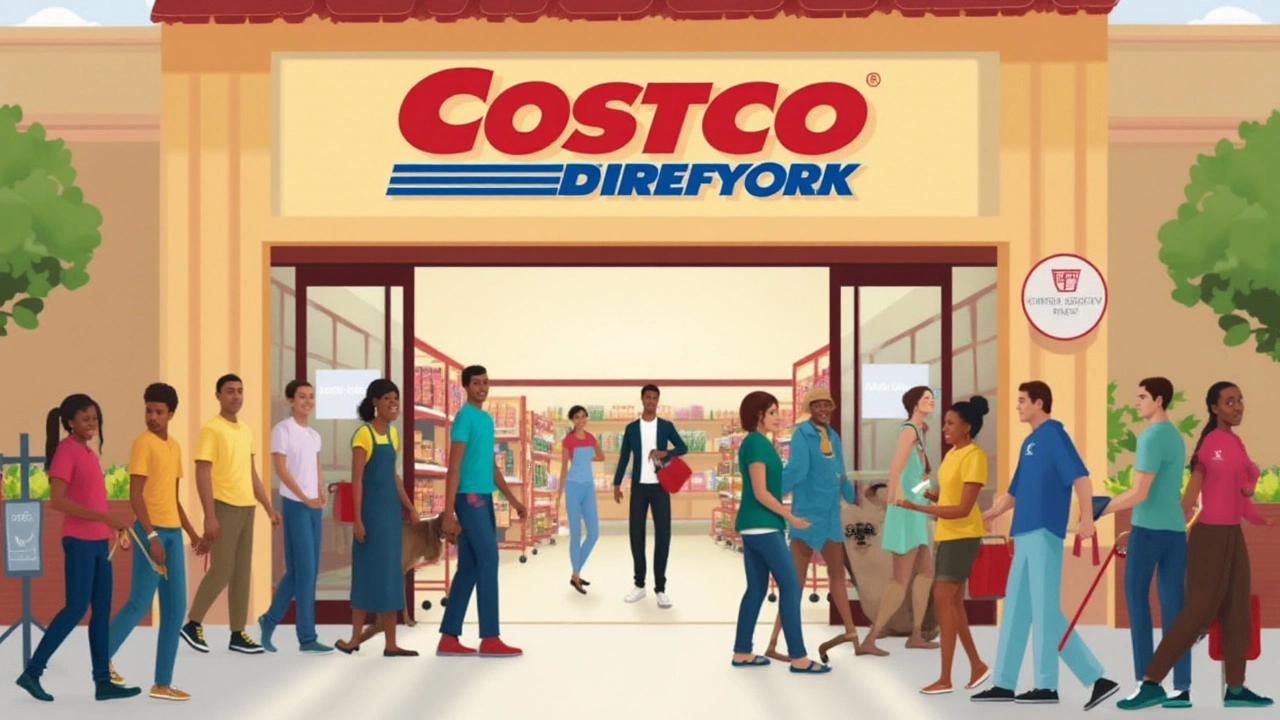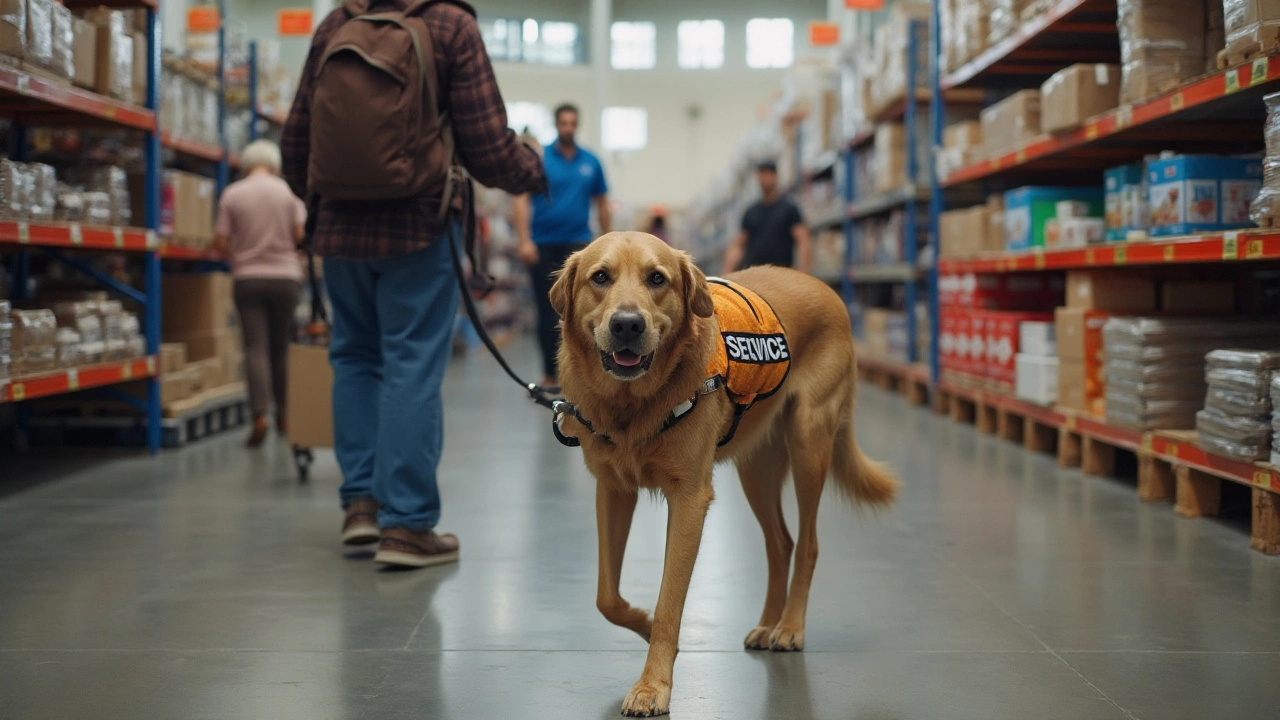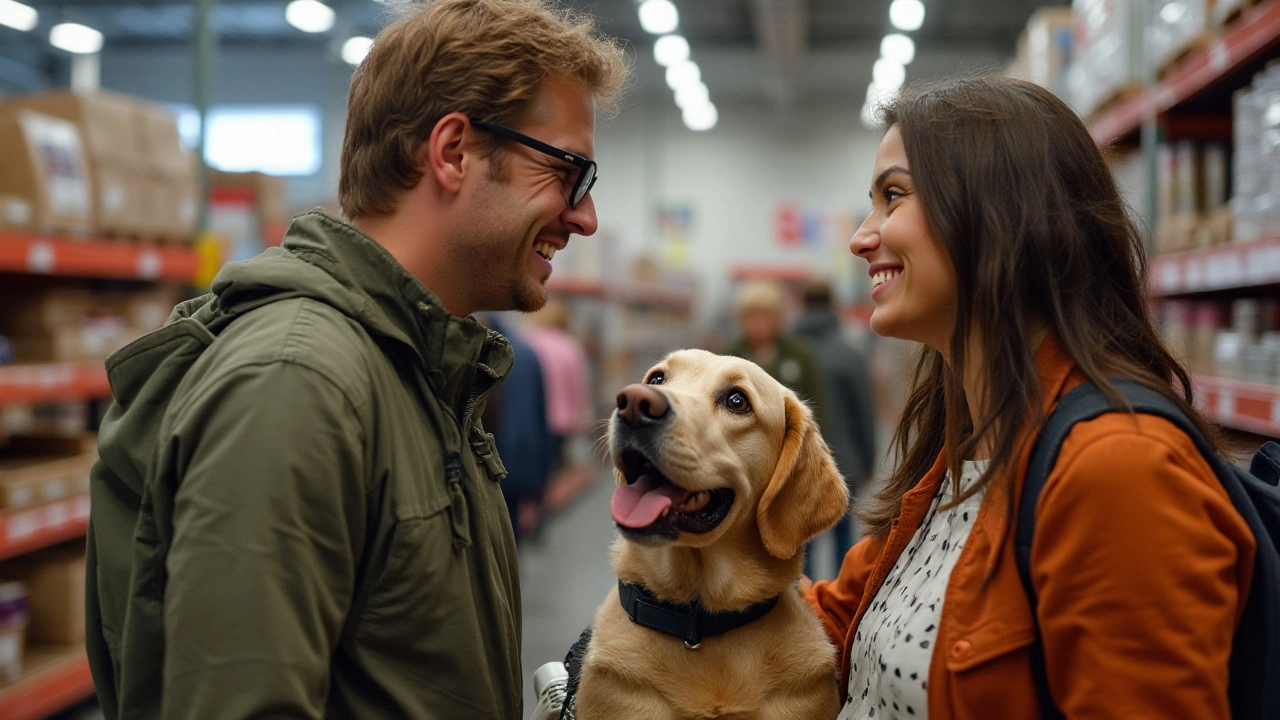
Bringing your loyal canine companion along on daily adventures is more than just having a buddy by your side—it can be a necessity for many. Whether for assistance or companionship, knowing how your furry friend fits into varying shopping policies is crucial. This holds especially true for bustling retail giants like Costco, where navigating aisles with your service dog involves understanding specific regulations.
Confusion around what stores can ask about service dogs adds to the complexity. It's not just about gaining entry; it's about ensuring comfort and compliance for everyone involved. Understanding the rights and responsibilities of both service dog owners and store personnel will help pave the way for a hassle-free visit.
- Understanding Service Dog Laws
- Costco's Service Dog Policy
- What Can Staff Legally Ask?
- Tips for Shopping with Service Dogs
Understanding Service Dog Laws
Service dogs have become indispensable aids for many individuals who rely on them for physical, mental, and emotional support. In navigating public spaces, it's essential to recognize the legal framework governing service dogs. Under the Americans with Disabilities Act (ADA), these loyal four-legged workers are defined as dogs that are individually trained to perform tasks related to a person's disability. This task-oriented training distinguishes them from pets or emotional support animals, which do not hold the same legal standing in public places. Knowing this distinction is crucial when planning your visit to places like Costco, where regulations might be strictly observed.
The ADA ensures that service animals are granted access to facilities and transportation systems, but it's important to note that emotional support, therapy, comfort, or companion animals are not recognized under its regulations. This legal distinction can sometimes lead to confusion among store staff and patrons. In essence, if your furry companion is considered a service dog by ADA standards, it should be welcomed in most public areas, including big retail chains. Yet, complexities arise when staff and the public remain uninformed about these distinctions, inadvertently leading to disputes and misunderstandings.
It's worth noting that countries like New Zealand and others in the Commonwealth might have variations in these laws, though the ethos of accessibility and support remains consistent. Interestingly, the legal aspects surrounding service animals are often accompanied by a struggle for public awareness, necessitating a balanced approach of patience and education. Balancing the rights of service dog owners with public safety and hygiene concerns can sometimes complicate matters. As Jessica Gross, an attorney specializing in disability law, points out,
"Public education remains a significant hurdle. Understanding and recognizing the service dogs' legal rights helps bridge the gap between service dog handlers and accessibility in public spaces."This insight serves as a reminder of the ongoing need for educating and reminding both the public and businesses of their responsibilities and the rights of individuals with service dogs.

Costco's Service Dog Policy
Shopping at a big-box store like Costco can be a unique experience, given its sheer size and the bustling number of shoppers finding their way through aisles loaded with wholesale wonders. As a membership-only warehouse club, Costco has a distinct set of policies, particularly when it comes to pets and service dogs. While service dogs are typically permitted as needed by law, Costco emphasizes the importance of their policy not merely as an adherence to law, but to embrace accessibility for customers who rely on their animal partners.
Under the Americans with Disabilities Act (ADA), Costco, like other establishments, must allow service dogs access to their stores, provided they aid individuals with disabilities. This is not just confined to assisting with physical tasks but also extends to those trained for psychiatric support. According to current policies, service dogs are welcomed with the expectation that they remain under control, typically on a leash, to ensure the safety of not only the handler but also the vast number of patrons sharing the same space.
For employees, Costco provides training to distinguish between pets and service animals, as pets are generally not allowed on the premises. This training includes familiarizing the workforce with what they are permitted to ask. Legally, employees can inquire whether a dog is a service animal required due to a disability. Specific queries about the handler's medical condition or demands for documentation are not permitted, ensuring a respectful and private interaction.
"By educating our staff and respecting the law, we accommodate the needs of those who rely on service animals," says a representative from Costco's customer service department.
Additionally, it is worth noting the logistics of navigating a busy store with a service dog. Given the crowded aisles and potential hazards like stacked items that curious pups might inadvertently disturb, owners are encouraged to keep their animals close and attentive. As part of accommodating service dogs, some Costco locations have piloted special hours to offer a quieter shopping experience, easing navigation for service dog handlers.
To many, Costco's policy highlights a balance between compliance and fostering an inclusive shopping environment. This balance is continuously refined through customer feedback, indicative of Costco's commitment to its diverse customer base. Hence, for owners of service dogs, understanding these policies and planning visits accordingly can significantly enhance the shopping experience. Whether buying in bulk or simply exploring wholesale options, knowing your rights and the store's expectations helps ensure a hassle-free trip.

What Can Staff Legally Ask?
When navigating the bustling aisles of massive retail establishments like Costco, service dog owners might wonder about what questions they might face upon entry. Legally, the staff's inquiries are surprisingly limited. Under the Americans with Disabilities Act (ADA), only two questions are permissible: Is the dog a service animal required because of a disability? What work or task has the dog been trained to perform? These questions focus on the function and necessity of the service animal, without prying into the nature of the individual’s disability, ensuring privacy and respecting the needs of the individual.
Staff cannot demand proof of disability or request documentary evidence of the dog’s training. This protection is crucial for upholding the rights of those utilizing service animals without subjecting them to unnecessary scrutiny. The policy aims to balance the dual needs of accommodating service animal handlers while maintaining a safe environment for other patrons. As such, it establishes a respectful distance, limiting intrusion into personal details. According to the ADA, a service animal is defined as any dog trained to perform tasks directly related to a person's disability, excluding emotional support or companionship as qualifying tasks.
While some may argue about the expansive breadth of what tasks service dogs undertake—from guiding visually impaired individuals to alerting about an oncoming seizure—it's important that their roles are acknowledged legally and socially. Notably, Costco abides by these ADA guidelines, emphasising a commitment to inclusivity. This not only facilitates a smooth shopping experience but also promotes awareness among staff and the general public. Remaining informed of these regulations helps service dog handlers advocate effectively for their rights, knowing when a question crosses a line into uncharted territory.
Ensuring staff are properly trained in addressing service dog scenarios is an integral part of supporting disabled individuals. Besides the initial legal queries, workers sometimes face challenges distinguishing service dogs from pets in areas where pets are not typically allowed. As mentioned in a 2023 report by the Service Animal Act Alliance, "Misidentifications are common but can be managed with simple, non-invasive inquiries." Stores make adjustments continuously through regular training and public education. Adopting awareness campaigns can significantly ease tensions by clarifying standards and rights. Ultimately, it is about achieving harmonious coexistence in shared spaces, guided by respect and legal standards.

Tips for Shopping with Service Dogs
Shopping with your service dog, while absolutely rewarding, requires a bit of insight and preparedness. To start, understanding the environment is crucial. Costco stores, known for their vast spaces, busy aisles, and the occasional avalanche of items from overloaded shelves, present unique challenges for your service dog. You want your service dog to feel comfortable amid the buzz of shopping carts, curious shoppers, and mouth-watering free samples. Proper training for these scenarios goes a long way, ensuring your dog can focus on assisting you, no matter how crowded the store becomes—or how tasty the smells are.
Your dog's harness, vest, or ID card can often ease any of the misunderstandings that arise. While businesses like Costco cannot demand proof of disability, identifiable gear for your service dog helps everyone involved feel more at ease. Remember, service dogs are trained to behave in certain ways, but unexpected circumstances arise. Keeping a leash no longer than four feet prevents unexpected tangles with strangers, which also prompts polite conversation instead of inconvenience.
Another key aspect is planning your visit during less busy times. The early morning hours or mid-afternoon on weekdays can provide a calm shopping experience. Training your dog for these crowded settings calls for an introduction to lower-stress times first. Gradually increase exposure as your dog becomes accustomed to the store’s bustle, maximizing both their confidence and ability to assist you. As behavioral expert Dr. Emily Watkins mentions in her book on service animals, "Consistency and gradual exposure are key to making your service dog feel at home in complex environments." Such approaches ensure both you and your companion enjoy stress-free outings.
Consider using a list and pre-planning your route through the store. This not only minimizes your time inside but also prevents frustration. Familiarize your dog with the scent of specific items used usually—we've all had enough of those wild goose chases up and down aisles because we couldn't find the dog food brand our furry friends prefer. Engaging your dog in this activity makes them feel involved and can make tracking items mentally stimulating.
Engaging with store employees tactfully can also enhance your experience. Briefly explaining the role of your service dog can dispel any concerns; many staff members are curious and helpful, wanting to understand how best they can assist. If asked about your dog's qualifications, you can offer that they perform essential services, lending the transparency valued by both parties. Trials and errors from past shopping excursions become valuable lessons, a part of the journey of making every Costco trip an event instead of a chore. Remember, staying informed about service dog policies ensures that each trip is a positive tale to tell.
